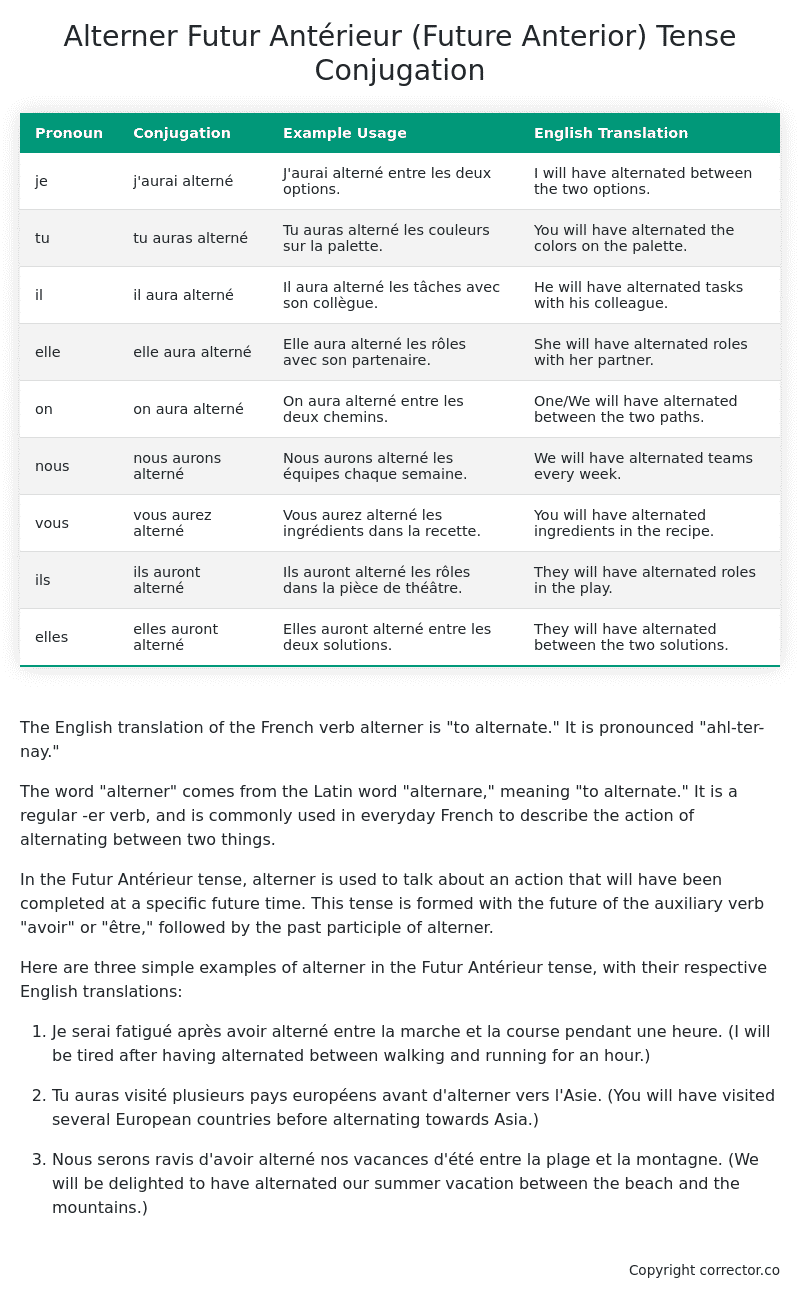Futur Antérieur (Future Anterior) Tense Conjugation of the French Verb alterner
Introduction to the verb alterner
The English translation of the French verb alterner is “to alternate.” It is pronounced “ahl-ter-nay.”
The word “alterner” comes from the Latin word “alternare,” meaning “to alternate.” It is a regular -er verb, and is commonly used in everyday French to describe the action of alternating between two things.
In the Futur Antérieur tense, alterner is used to talk about an action that will have been completed at a specific future time. This tense is formed with the future of the auxiliary verb “avoir” or “être,” followed by the past participle of alterner.
Here are three simple examples of alterner in the Futur Antérieur tense, with their respective English translations:
-
Je serai fatigué après avoir alterné entre la marche et la course pendant une heure. (I will be tired after having alternated between walking and running for an hour.)
-
Tu auras visité plusieurs pays européens avant d’alterner vers l’Asie. (You will have visited several European countries before alternating towards Asia.)
-
Nous serons ravis d’avoir alterné nos vacances d’été entre la plage et la montagne. (We will be delighted to have alternated our summer vacation between the beach and the mountains.)
Table of the Futur Antérieur (Future Anterior) Tense Conjugation of alterner
| Pronoun | Conjugation | Example Usage | English Translation |
|---|---|---|---|
| je | j’aurai alterné | J’aurai alterné entre les deux options. | I will have alternated between the two options. |
| tu | tu auras alterné | Tu auras alterné les couleurs sur la palette. | You will have alternated the colors on the palette. |
| il | il aura alterné | Il aura alterné les tâches avec son collègue. | He will have alternated tasks with his colleague. |
| elle | elle aura alterné | Elle aura alterné les rôles avec son partenaire. | She will have alternated roles with her partner. |
| on | on aura alterné | On aura alterné entre les deux chemins. | One/We will have alternated between the two paths. |
| nous | nous aurons alterné | Nous aurons alterné les équipes chaque semaine. | We will have alternated teams every week. |
| vous | vous aurez alterné | Vous aurez alterné les ingrédients dans la recette. | You will have alternated ingredients in the recipe. |
| ils | ils auront alterné | Ils auront alterné les rôles dans la pièce de théâtre. | They will have alternated roles in the play. |
| elles | elles auront alterné | Elles auront alterné entre les deux solutions. | They will have alternated between the two solutions. |
Other Conjugations for Alterner.
Le Present (Present Tense) Conjugation of the French Verb alterner
Imparfait (Imperfect) Tense Conjugation of the French Verb alterner
Passé Simple (Simple Past) Tense Conjugation of the French Verb alterner
Passé Composé (Present Perfect) Tense Conjugation of the French Verb alterner
Futur Simple (Simple Future) Tense Conjugation of the French Verb alterner
Futur Proche (Near Future) Tense Conjugation of the French Verb alterner
Plus-que-parfait (Pluperfect) Tense Conjugation of the French Verb alterner
Passé Antérieur (Past Anterior) Tense Conjugation of the French Verb alterner
Futur Antérieur (Future Anterior) Tense Conjugation of the French Verb alterner (this article)
Subjonctif Présent (Subjunctive Present) Tense Conjugation of the French Verb alterner
Subjonctif Passé (Subjunctive Past) Tense Conjugation of the French Verb alterner
Subjonctif Imparfait (Subjunctive Imperfect) Tense Conjugation of the French Verb alterner
Subjonctif Plus-que-parfait (Subjunctive Pluperfect) Tense Conjugation of the French Verb alterner
Conditionnel Présent (Conditional Present) Tense Conjugation of the French Verb alterner
Conditionnel Passé (Conditional Past) Tense Conjugation of the French Verb alterner
L’impératif Présent (Imperative Present) Tense Conjugation of the French Verb alterner
L’infinitif Présent (Infinitive Present) Tense Conjugation of the French Verb alterner
Struggling with French verbs or the language in general? Why not use our free French Grammar Checker – no registration required!
Get a FREE Download Study Sheet of this Conjugation 🔥
Simply right click the image below, click “save image” and get your free reference for the alterner Futur Antérieur tense conjugation!

Alterner – About the French Futur Antérieur (Future Anterior) Tense
Construction
Common Everyday Usage Patterns
Interactions with Other Tenses
For example
Summary
I hope you enjoyed this article on the verb alterner. Still in a learning mood? Check out another TOTALLY random French verb conjugation!


